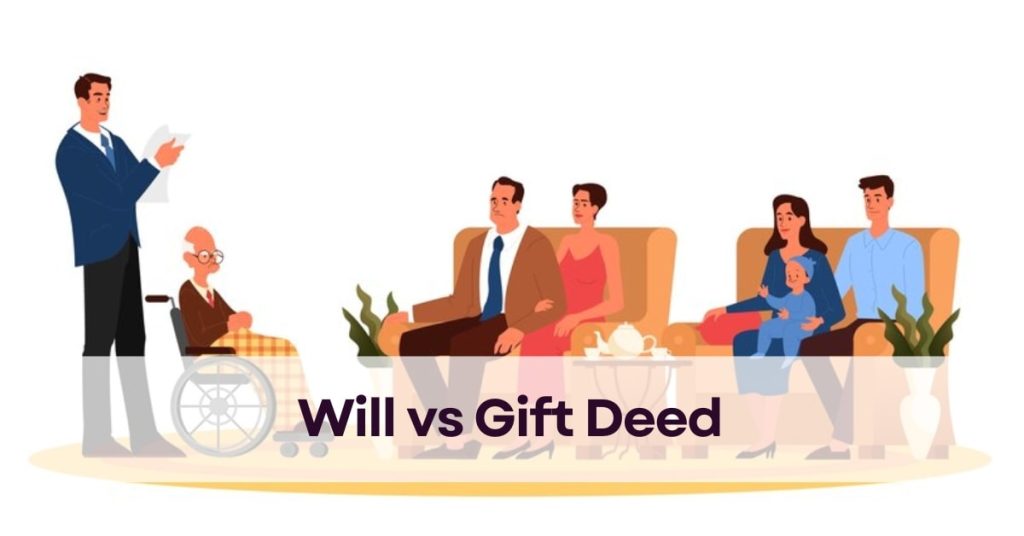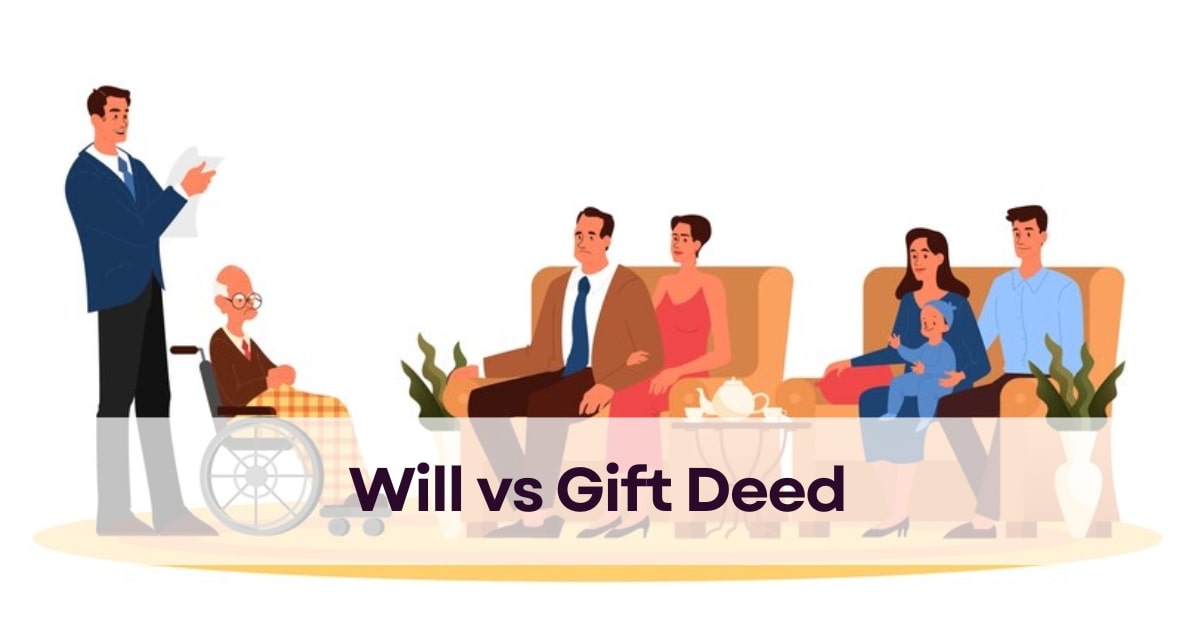
Table Of Content
- What is Will and Gift Deed?
- Importance of Will and Gift Deed
- Difference between Will and a Gift Deed
- Advantages and Disadvantages of Will and Gift Deed
- Can a Gift Deed be changed by Will?
- Can a Gift Deed override a Will?
- Can a Will be Challenged in Court?
- Is a Will valid if it is not Registered?
- Conclusion
A fundamental aspect of estate planning is understanding the differences between a WILL and a Gift Deed. While both legal instruments relate to the transfer of assets, they serve different purposes and operate in different circumstances. A WILL sets out a person’s occuring wishes regarding the distribution of their assets and becomes effective only after their death.
On the contrary, a gift contract facilitates the immediate transfer of property from the donor to the donee during the donor’s lifetime, without any monetary exchange. This introduction lays the foundation for understanding the critical differences between these essential components of comprehensive property management.
What is Will and Gift Deed?
A Will is a legal document that states a person’s wishes regarding the distribution of their property and assets after death. The Testator appoints an executor who will be responsible for ensuring that the instructions in his will are carried out. A will is revocable and can be changed or updated by the testator (testator) at any time before death, as long as the testator (testator) has mental capacity. It takes effect only after the death of the testator and usually goes through a legal process called probate.
A Gift Deed is a legal document that is used to transfer ownership of personal or immovable property from one person (donor) to another (donor) without exchanging money. Unlike a will, a gift deed becomes effective upon execution and registration where required by law. It is generally irrevocable and once the deed has been executed and the property has been transferred, it cannot be revoked unless there is a specific legal basis. The gift deed is independent of the donor’s death and is executed during the donor’s lifetime.
In short, a will expresses the wishes regarding the distribution of property after death, while a gift deed facilitates the immediate transfer of property during the donor’s lifetime. Both serve specific purposes in estate planning and have specific legal implications. To ensure compliance with local laws, we recommend that you consult with a legal professional when creating or executing any document.
What are the Importance of Will and Gift Deed?
Both the documents have their own importance which we will be discussing below:
Importance of a Will
- A will ensures that a person’s property and assets are distributed after their death according to their specific wishes. This can help prevent disputes between family members and ensure that the intended beneficiaries receive their rightful inheritance.
- This provides peace of mind knowing that their children will be cared for by someone they trust.
- A will allows the testator to appoint an executor who will be responsible for carrying out the instructions in the will. This person is tasked with managing assets and distributing assets.
- Without a will, the distribution of property is determined by intestacy laws, which may not be in accordance with the testator’s wishes. A will provides control over who inherits what.
- A will can specify specific items or amounts to be given to specific individuals or organizations, allowing for sentimental or charitable bequests.
Also Read, Types of Will
Importance of a Gift Deed:
- Immediate transfer of property: The gift deed allows the immediate transfer of property from the donor to the donor during the lifetime of the donor. This is especially important when it comes to estate planning or gifting real estate to a loved one.
- Tax planning: Gift certificates can be used as a tax planning tool. Depending on local tax laws, gifting property may be more beneficial than inheriting property through inheritance.
- Avoid Probate: Because gift deeds take effect immediately, the property transferred does not normally go through the probate process, saving time and money for both the donor and donee.
- Express Your Generosity: A gift certificate allows a person to express their generosity and help a loved one or charity during their lifetime.
- Asset Protection: In some cases, transferring assets through a gift deed may be a strategic asset protection tool, but it is important to obtain legal advice in this regard.
Both wills and gifts deed play an important role in estate planning and asset management, but their importance varies depending on your individual circumstances and goals.
What is the Difference between Will and a Gift Deed?
A “will” and “deed of gift” are legal documents used in estate planning, but they serve different purposes. The difference between Will and Gift Deed are as follows:
| Basis Of Distinction | WILL | Gift Deed |
| Purpose | A will is a legal document that determines how a person’s property and assets will be distributed after death. You will also appoint an executor who will be responsible for carrying out the wishes in your will. | A deed of gift is a legal document that is used to transfer the ownership of personal or immovable property from one person (donor) to another (donor) without exchanging money. |
| Immediate Transfer | A will becomes effective only after the death of the maker (testator) | Unlike a will, a gift deed becomes effective upon execution and registration (where required by law). |
| Revocability | A testator can change or revoke a will at any time before death, provided the testator is of sound mind. | Generally, after the deed of gift and transfer of property is executed, it cannot be revoked unless there is a specific legal basis. |
| Distribution/Transfer | The testator can determine who will inherit his property, how it will be divided and under what conditions. | The deed of gift has nothing to do with the death of the donor. Transfer of property during the life of the informant. |
| Tax Implication | The tax implication has nothing to do with a Will. | When a gift agreement is entered into, there may be tax implications for both the donor and the recipient, and these may vary depending on the jurisdiction and the value of the property. |
| Legal Process | After the death of the testator, the will must go through a legal process, commonly called a probate, to ensure its validity and distribute the assets as directed. | The Legal Procedure is done while the donor is alive. |
| Registration | There is no compulsion in getting the WILL registered but it would be recommended to do so. | In many jurisdictions, gift deeds must be registered with the relevant authorities to be legally valid. |
In short, a will is a document that shows how a person’s assets will be distributed upon death, while a gift deed transfers assets from one person to another during the donor’s lifetime. A document used to transfer ownership.
What are the Advantages and Disadvantages of Will and Gift Deed?
There are various pros and cons of Will and Gift Deed that we have outlined below. Let have a look:
Advantages of a will:
- Control: Allows the testator to determine how his assets are distributed.
- Appointing an executor: Allows the executor to choose who will handle his property.
- Specific Bequests: Specific items or amounts can be assigned to individuals or organizations.
- Avoiding intestacy: Avoiding the distribution of assets based on intestacy laws.
Disadvantages of a will:
- Probate Process: Probate usually goes through a legal process that can be time-consuming and expensive.
- Public record: The will becomes part of the public record during probate, which can lead to a loss of privacy.
- Possible objection: The will can be contested in court, which can lead to a dispute between the heirs.
- Accrual Distribution: It takes effect only after the death of the testator, so it may not cover your immediate needs.
Gift Deed Benefits:
- Immediate Transfer: The property is transferred immediately avoiding collateral.
- Tax Planning: Depending on local laws, this can be a tax efficient way to transfer assets.
- Asset Protection: May provide protection against creditors or legal claims.
- Expressing Generosity: Enables donors to help loved ones and charities throughout their lives.
Disadvantages of gift certificate:
- Irrevocable: Generally, Gift deed cancellation cannot be done after execution, except in special legal circumstances.
- Tax Implications: Both the donor and donee may have tax liability in connection with the gift.
- Potential conflicts: Depending on family relationships, gifting property can lead to conflict.
- Loss of control: The donor has no control over the property after donation.
Ultimately, the choice between a will and gift deed depends on your individual circumstances, goals and legal considerations. Consulting with a legal professional is critical to making informed decisions and navigating the complexities of estate planning.
Can a Gift Deed be changed by Will?
Yes, a deed of gift can be changed or revoked by will if certain circumstances exist and local law allows such changes. Typical behavior is:
- Revocation of a will: A person’s will can contain provisions that relate to gifts that have already been executed. A will can specify whether certain properties and assets listed in previous gift documents should be treated differently or canceled altogether.
- Clarity of intentions: It is important that the language of the will clearly expresses the testator’s intentions regarding the property included in the gift document.
- Timeliness: Before the death of the testator with common sense, the will must be drawn up and executed.
Can a Gift Deed override a Will?
Yes, a properly executed Gift Deed can override provisions in a Will. Once a property is gifted, it is no longer part of the donor’s estate, and therefore, it cannot be disposed of or distributed through the Will. The recipient becomes the legal owner, and the Will’s instructions do not apply to the gifted property.
Can a Will be Challenged in Court?
Yes, you can challenge a will in court through a legal process. This may occur if one party believes there are grounds to challenge the validity or terms of the will. Common grounds for contesting a will include claims of undue influence, testator’s incapacity, fraud or malpractice. Participants must provide evidence to support their claim. If the court finds that the objection is valid, the will may be partially or completely invalidated. When considering a will contest, it is imperative that you consult with a qualified attorney as the process involves complex legal procedures and requirements.
Is a Will valid if it is not Registered?
Yes, a Will is valid even if it is not registered. However, it’s advisable to get it registered as it gives you more authenticity when represented in the court. Also keep the original Will in a safe and accessible place to ensure it can be located after the testator’s passing.
Conclusion
Yes, a will is valid even if it is not registered. Registration is not a legal requirement for the validity of a will. However, it is best to keep the original will in a safe and accessible place to ensure that it can be found after the testator’s death. And if you are looking to make a WILL you can redirect to our Service for WILL.


